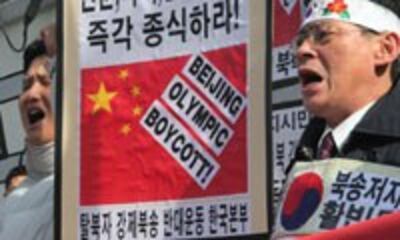
WASHINGTON—The U.S. State Department has delivered a stinging criticism of China for its repatriation of North Koreans found in its territory, and for preventing defectors from gaining access to the United Nations refugee agency.
"China refused (and continues to refuse) to abide by its obligations as a party to the 1951 Convention relating to the Status of Refugees," said the report, which was submitted to Congress under the terms of the U.S.'s North Korea human rights legislation passed in 2004.
What's more, Beijing has consistently failed to abide by a 1967 protocol requiring it to grant UNHCR access to North Koreans who seek asylum in China and to permit screenings of persons asserting a need for protection, the report said.
As many as 300,000 North Koreans are believed by defector groups to be living clandestinely in China. Small groups of defectors frequently storm foreign embassies and other buildings, and Beijing has allowed several dozen North Koreans to leave for a third country in this way, ostensibly for health reasons.
Thousands in hiding
Beijing regards North Koreans who cross the border illegally as economic migrants, and frequently repatriates them under an agreement with Pyongyang.
However, the State Department estimated the number of North Koreans in China at between 30,000 and 50,000, while it recognized that non-governmental groups said the numbers were much higher. It said improved economic conditions in North Korea had contributed to a fall in defector numbers, which had peaked in the late 1990s.
But it said the pressure on defectors had been heightened by the Chinese authorities' attitude. "While North Koreans were previously seen walking through Chinese cities, today most remain in hiding for fear of being deported," it said.
While China appeared to have stepped up monitoring of North Koreans within its borders following the North Korea Human Rights Act in October 2004, many North Koreans still managed to cross back and forth for work, food and to trade goods, it said.
"There are reliable reports that North Korean women have been trafficked into northeastern China as brides or to work in the sex trade," the report said.
Forced repatriations
The State Department’s 2004 Human Rights Report on China says that several thousand North Koreans were reportedly detained and forcibly returned to North Korea in 2004, where many faced persecution. Some of those repatriated may have been executed upon their return.
The report said Beijing was still largely to blame for forced repatriations and denial of the rights of North Koreans as refugees.
"China denies North Koreans access to UNHCR personnel. North Koreans cannot easily access UNHCR’s office in China because of China’s extensive security presence there. China will not permit UNHCR staff to travel to northeast China," it said.
It said that no North Koreans had been resettled in the United States under existing refugee admissions programs in the past five years. Only nine North Korean refugees have been awarded politicial asylum in the United States since 2002. It cautioned North Korean refugees against trying to break into U.S. buildings and diplomatic missions overseas, however.
"We will continue to work with South Korea, other governments and international organizations to develop the appropriate mechanisms to allow the resettlement of some North Korean nationals in the United States as refugees," the report said.
North Korea executed around 60 defectors in January in a bid to discourage others from seeking political asylum in South Korea, according to a North Korean defector group.
Executions to send a message
"North Korea executed in public eight to nine North Korean defectors sent back to Chongjin City, North Hamgyeong Province, from China in mid-January in an effort to prevent North Koreans from fleeing," the Seoul-based Headquarters for Protection of North Korean Defectors said in a recent statement.
A total of about 60 North Korean defectors were executed in various detention centers throughout North Korea at a similar time, the group said.
Some reports said those executed were specifically those who had tried unsuccessfully to break into foreign missions in China with the help of South Korean Christian missionaries.
North Korea recently tightened security along its border with China to check North Koreans making their way into China with bribes to border guards, according to defector sources.
